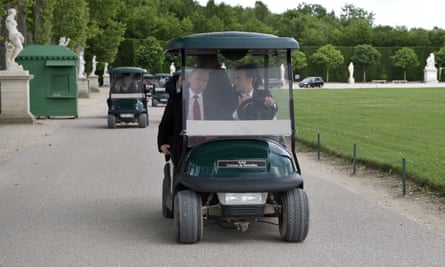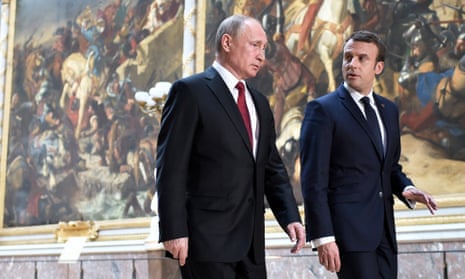Emmanuel Macron, the new French president, has warned that France would respond immediately to any use of chemical weapons in Syria, while urging a closer partnership with Russia in fighting Islamic State (Isis) in the country.
“A very clear red line exists on our side – that is the use of chemical weapons by whomever,” Macron said at a joint news conference after his first meeting with the Russian leader, Vladimir Putin.
The highly symbolic meeting in the sumptuous setting of the Palace of Versailles was aimed at defining the two leaders’ personal relationship after tension and mistrust during the French presidential election campaign and suggestions Russia had sought to meddle in the French democratic process.
Emerging with Putin from two hours of talks and lunch in the 2,300-room palace, Macron said he wanted to strengthen cooperation with Russia in seeking a solution to the Syria conflict. He said this involved talking to all parties in a “diplomatic and political framework”.
But Macron said France would show “no weakness” if chemical weapons were used, and would immediately respond.
French spies amassed and publicly released evidence last month that indicated the Assad regime had used toxic sarin gas on the town of Khan Sheikhun, an attack that provoked the US to launch missiles on a Syrian air base in its first targeted attack against the Syrian president’s forces.
Macron said he favoured a democratic transition in Syria that would “preserve the Syrian state”. He said: “Failed states in the region are a threat to our democracies, and we have seen each time they have enabled terrorist groups to advance.”
“Our absolute priority is the fight against terrorism,” he added, calling for the “eradication of terrorist groups” — and Isis in particular — through closer partnership with Russia.

Macron had not been Putin’s candidate of choice and the Russian leader had handed Macron’s far-right rival, Marine Le Pen, a major publicity coup when he granted her a surprise audience at the Kremlin a month before the French presidential election’s first round.
During the campaign, Macron had harsh words for Moscow, accusing Russia of following a “hybrid strategy combining military intimidation and an information war”.
The Macron camp alleged during the election campaign that Russia had been engaged in disinformation efforts, and at one point refused accreditation to the Russian state-funded Sputnik and Russia Today news outlets, which it said were spreading Russian propaganda and fake news.
In a dramatic announcement two days before the final vote, Macron’s team said thousands of its campaign emails had been released in a major hacking operation. Cybersecurity analysts suggested the operation might have been undertaken by Russia-affiliated groups. Moscow and Russian news outlets had rejected any allegations of interference.
Asked by journalists about alleged Russian efforts to influence the election, Putin rejected outright any allegations of meddling in the French election. He said “that doesn’t exist as a problem”, adding that Macron had not raised the issue at their meeting.
He also brushed aside a question on suspected Russian hacking of Macron’s campaign, saying it was just media speculation and therefore not for politicians to comment on. Putin defended meeting Le Pen and said it absolutely did not mean that Moscow had sought to influence the election result.
Macron, however, used the press conference to hit at Russian influence, saying Russia Today and Sputnik had engaged in spreading propaganda and fake news. “When media organs spread slanderous falsehoods, they are no longer journalists,” he said at the joint press conference.
Macron described the two leaders’ conversation as “extremely frank and direct”, saying he had made clear “everything I thought on different subjects”. He said he would be “constantly vigilant” about gay rights in Chechnya, where Russian officials are actively investigating claims of a purge of gay men.
For his part, Putin warned that sanctions against Russia over Ukraine would “in no way” resolve the crisis. Both leaders agreed the time was right for a new round of peace talks on Ukraine.
The body language seemed cordial but cool, although Macron insisted there was “warmth in the room” and patted Putin on the shoulder. The red-carpet handshake was swift and polite; Macron used his recent white-knuckle handshake with US president Donald Trump before the Nato summit to make a point that France would not back down.
The French leader chose to host Putin in the unusual setting of Versailles, a symbol of French monarchy and revolution, which sent two messages.
First, it set out to emphasise historical French dominance on the world stage: when Macron accompanied Putin for a slow walk down the palace’s longest room, the Battles Gallery, the two leaders were pointedly surrounded by massive paintings of 15 centuries of French military successes.
But it was also flattering to Putin in to be hosted amid the grandeur of the palace – in his first visit there – and to open a new exhibition on Tsar Peter the Great’s visit to France in 1717, marking 300 years of Franco-Russian ties. The joint opening of an exhibition was also a way to find more neutrality and less formality, as opposed to a state visit with pomp in the Élysée palace.
Macron and Putin’s personal relationship will be key factor in the difficult issues of Syria and Ukraine. They are a generation apart, with a starkly different world view. Macron, 39, is putting the European project first, while Putin, 64, had banked on the EU crumbling.
Macron said during the French election campaign that he was not “one of those people who are fascinated by Vladimir Putin” whose values he didn’t share.
Relations between France and Russia have been plagued by mistrust in the past few years, particularly over Syria and Ukraine. The two countries are in stark opposition over the Syrian civil war, with Moscow backing Assad and France supporting rebel groups trying to overthrow him.
France also helped spearhead the EU’s economic sanctions on Russia over the seizure of Crimea and Russian backing for insurgents in the east of the former Soviet republic. Putin’s Versailles visit meant Macron was the first western leader to speak to Putin following the G7 summit this weekend, where western leaders agreed to consider new measures against Moscow if the situation in Ukraine did not improve.
Putin had cancelled his last scheduled visit to Paris in October after the Kremlin accused France of seeking to humiliate the Russian leader. Moscow cancelled the October trip hours after the then president François Hollande said Russia could face war crimes charges over its bombardment of Aleppo, Syria’s second largest city.
